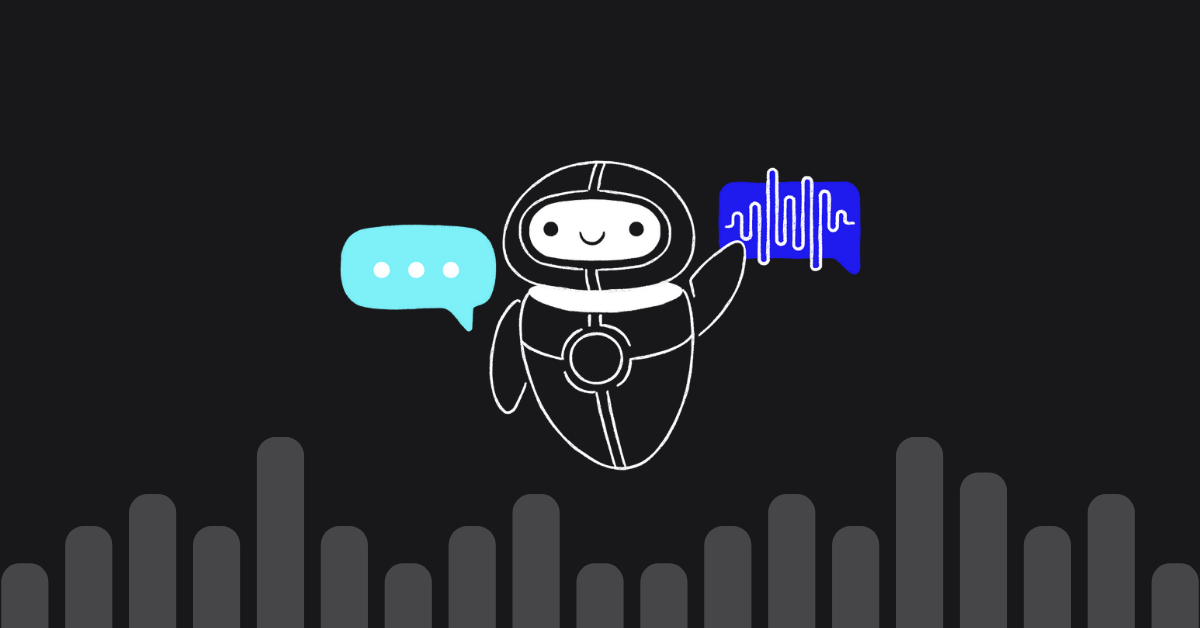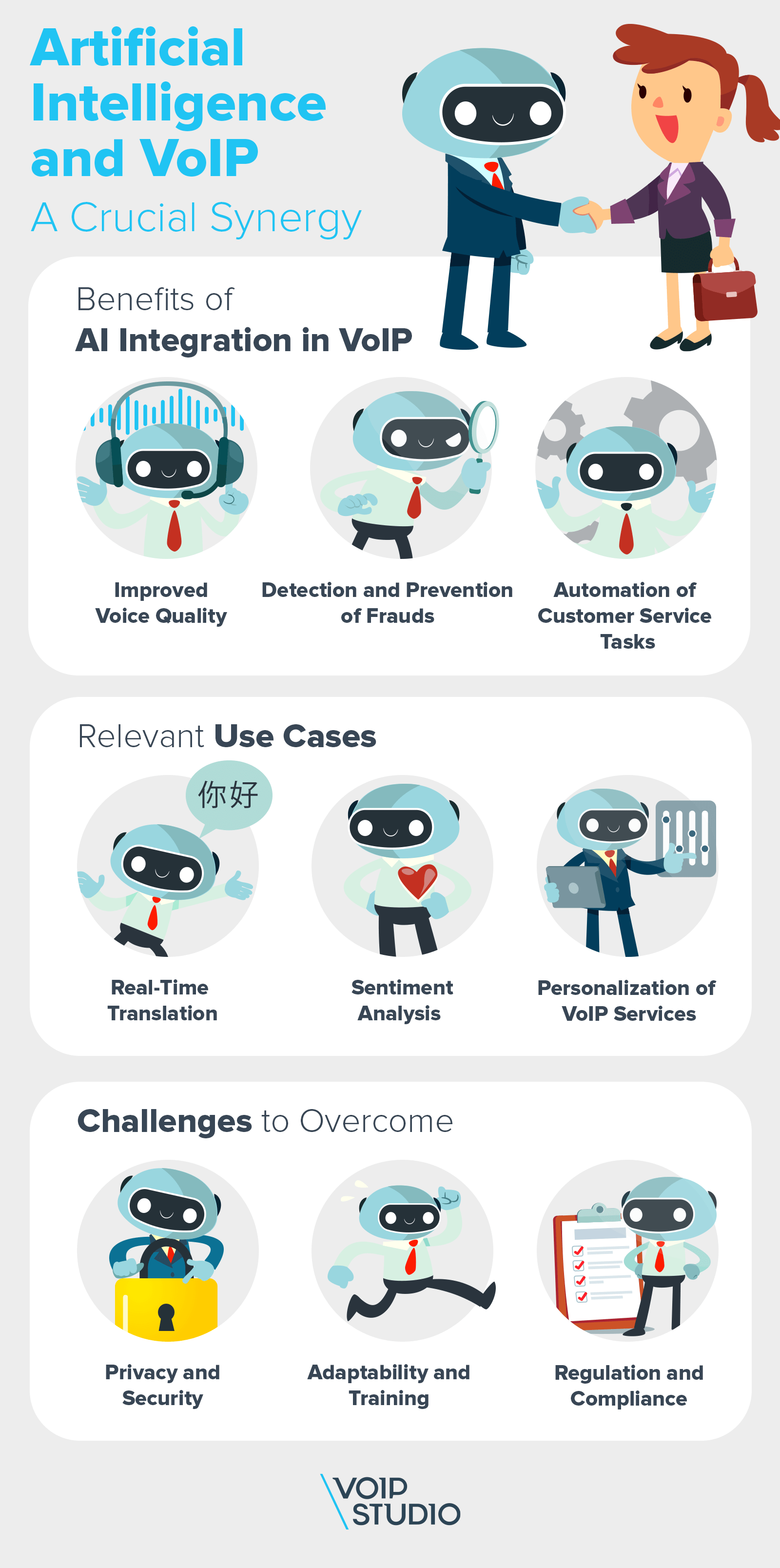
Table of contents
Communication has undergone a radical transformation in recent decades, and much of this evolution has focused on voice transmission through VoIP technology (Voice over Internet Protocol).
VoIP represents an innovative technology that has revolutionized the way people and businesses communicate by leveraging the Internet to transmit voice instead of relying on traditional telephone networks.
What is AI VoIP
AI VoIP refers to the use of Artificial Intelligence (AI) technologies in Voice over Internet Protocol (VoIP) communications. AI is employed in various aspects of VoIP to enhance call quality, VoIP security, and user experience.
This includes features like:
- Automated call routing
- Voice recognition
- Sentiment analysis
- Fraud detection, among others, to optimize and improve VoIP services.
AI’s integration into VoIP systems aims to make voice communications more efficient, intelligent, and secure.
Key concepts of AI
Artificial Intelligence (AI) is a field of computer science that focuses on developing systems and programs capable of performing tasks that, if done by a human, would require intelligence.
Next, we will explore the fundamental concepts of AI and its main types:
Artificial Intelligence (AI)
AI refers to the ability of a machine or computer system to perform tasks that would typically require human intelligence. This includes learning, adaptation, and decision-making.
Machine Learning
Machine Learning is a subfield of AI that concentrates on developing algorithms and models that enable computers to learn and improve their performance in specific tasks through prior experience and data. This can encompass classification, regression, clustering algorithms, and more.
Common examples include movie recommendations on services like Netflix and email spam detection.
Natural Language Processing (NLP)
NLP deals with the interaction between computers and human language. It enables machines to understand, analyze, and generate text or speech in a manner similar to how a human would.
It is used in applications such as virtual assistants, automatic translation, sentiment analysis on social media, and chatbots.
Computer Vision
Is a branch of AI that allows machines to interpret and understand the visual world.
This is applied in object detection in autonomous vehicles, facial recognition in security applications, and medical diagnosis from medical images.
Relevance of AI VoIP
As VoIP technology has advanced, one of the most significant and promising trends is the integration of Artificial Intelligence (AI) in this field. AI has become a fundamental catalyst for enhancing the functionality and efficiency of VoIP communications.
AI opens up new possibilities regarding applications and services and addresses significant challenges such as fraud detection, sound quality improvement, and customer service automation.
In this article, we will explore in-depth how AI is transforming the world of VoIP and how these innovations redefine how we communicate over the Internet.
We will analyze specific use cases, key technologies, and the promising future of this symbiosis between artificial intelligence and VoIP. Let’s delve into the silent revolution happening in the world of VoIP thanks to artificial intelligence.
Artificial Intelligence and VoIP: A Crucial Synergy
The combination of Artificial Intelligence (AI) and VoIP technology has proven to be a crucial synergy that completely transforms how we experience communications in the digital era. This fusion is driving significant improvements in the quality, efficiency, and security of calls and other VoIP services.
Integrating AI into VoIP provides significant benefits, from improving voice quality to automating customer service tasks.
However, it also presents challenges that must be carefully addressed to harness its potential fully.
Benefits of applying AI to VoIP
Improved Call Quality: How AI Enhances VoIP Calls
The quality of Voice over Internet Protocol (VoIP) calls is critical to business and personal communication in the digital era. Artificial Intelligence (AI) enhances this quality, offering a smoother and more effective communication experience.
Let’s explore how AI contributes to the quality of VoIP calls:
– Real-Time noise reduction
AI can detect and reduce unwanted background noise during a VoIP call. Audio signal processing algorithms can identify annoying sounds like air conditioning hum or background noise in a cafe and effectively suppress them. It ensures the caller’s voice remains clear and sharp, even in noisy environments.
– Echo cancellation
AI can also address the issue of echo in VoIP calls. Echo cancellation algorithms identify and eliminate echoes that can occur due to audio feedback in the connection. It ensures that callers do not hear their voice repeatedly, improving call quality and the user experience.
– Packet loss correction
In unstable or congested networks, data packets are often lost during a VoIP call, leading to poor audio quality. AI can intervene to correct these losses. Packet loss correction algorithms use techniques like interpolation to reconstruct lost data and minimize audio interruptions.
– Bandwidth optimization
AI can intelligently manage available bandwidth during a VoIP call. It involves dynamically adjusting audio quality based on network conditions. If the connection is strong, AI may allow higher audio quality, while in weaker connections, it optimizes compression to prevent call drops.
– Jitter detection and correction
Jitter refers to variations in network latency, which can cause audio distortions. AI can detect jitter patterns and apply compensation techniques to smooth out audio transmission, ensuring a seamless and uninterrupted conversation.
Voice Recognition and Text Conversion in VoIP
Voice recognition and text conversion are advanced technologies transforming how we interact in Voice over Internet Protocol (VoIP) calls. These applications of Artificial Intelligence (AI) offer significant benefits in terms of efficiency and accessibility.
Applications of Voice Recognition in VoIP
- Voice Commands and Call Control: Voice recognition applications enable users to control VoIP calls using voice commands. You can initiate calls, put them on hold, transfer, or end them simply by speaking. It streamlines the process and is especially useful in business environments managing multiple calls.
- Real-Time transcription: During a call, AI can transcribe spoken conversations into text in real-time. This transcription is helpful for the hearing impaired, automatically taking notes during a call or generating accurate records of meaningful conversations.
Note: VoIPstudio users can now take advantage of automatic voice-to-text transcription powered by AI, thanks to our platform’s integration with Whisper.
- Unwanted call filtering: Voice recognition can help identify and filter unwanted calls, such as telemarketing or scam calls. Suspicious keywords and voice patterns can trigger the automatic blocking of unwanted calls.
Automatic Translation in International Calls
- Multilingual communication: International calls often involve people speaking different languages. AI can automatically translate speech from one language to another in real time. It facilitates seamless communication in business and personal calls.
- Breaking language barriers: Automatic translation in international calls overcomes language barriers and allows businesses to expand their global reach without worrying about language barriers. It is essential for international trade and global collaboration.
- Improved Translation Quality: Advances in AI have significantly improved automatic translation quality. The technology can discern the speaker’s context and intentions, producing more accurate and natural translations.
Virtual Assistants and Chatbots in VoIP: Enhancing the User Experience
AI-based virtual assistants and chatbots have become essential tools in Voice over Internet Protocol (VoIP) communications, providing a more efficient and personalized user experience.
How AI-Based virtual assistants improve the user experience
- Immediate 24/7 attention: Virtual assistants are available 24/7. It means users can get assistance and answers to their queries anytime, eliminating the need to wait for an agent to be available.
- Quick and accurate responses: Virtual assistants can respond quickly and accurately to common questions or simple tasks. This streamlines interactions and efficiently resolves issues.
- Personalization: Virtual assistants can adapt to individual user preferences and needs. They can remember previous information, such as purchase histories or communication preferences, to provide a more personalized experience.
- Automation of repetitive tasks: Virtual assistants can handle repetitive tasks, such as scheduling appointments or verifying data, freeing up human agents to address more complex and meaningful issues.
Examples of customer service use cases
- Technical support: Virtual assistants can assist users with common technical issues, such as resetting passwords, troubleshooting connection problems, or providing basic troubleshooting steps.
- Account management: Users can use virtual assistants to check their account balance, transfer funds, or make bill payments quickly and easily.
- Reservations and appointments: Virtual assistants can schedule reservations at restaurants, hotels, or medical appointments based on user preferences, sending confirmations and reminders.
- Order tracking: Users can check the status of their orders and receive real-time updates on the location and estimated delivery time.
Real-Time sentiment analysis and feedback with AI VoIP calls
Real-time sentiment analysis and feedback with AI VoIP calls allow businesses to understand customer emotions and needs during interactions better.
How Artificial Intelligence evaluates user sentiment in calls
- Emotional Voice Analysis
AI can analyze the characteristics of the caller’s voice, such as tone, speed, and intonation, to determine their emotional state. It identifies whether the user is happy, angry, worried, or neutral during the call.
- Text and keyword analysis
When calls are automatically transcribed in real-time, AI can analyze the resulting text for keywords related to emotions or dissatisfaction. For example, detecting words like “frustrated,” “problem,” or “unsatisfied” can indicate negative sentiment.
- Natural Language Processing (NLP)
Natural Language Processing allows AI to understand the conversation’s context and recognize language patterns that denote emotions. It includes detecting sarcasm, irony, or nuances in speech.
Business applications for measuring customer satisfaction
- Automated surveys: AI-based systems can automatically send customer satisfaction surveys after a call. These surveys evaluate the user experience and allow businesses to gather valuable feedback for continuous improvement.
- Issue detection: AI can identify common issues and challenges users mention during calls. It enables businesses to address problem areas and improve service quality.
- Cross-Selling opportunities identification: By analyzing conversations, AI can detect opportunities to offer additional products or services relevant to the customer, enhancing cross-selling and customer retention.
- Agent training and evaluation: Call recordings analyzed by AI can be used to train customer service agents and assess their performance in handling user emotions and customer satisfaction.
- Real-Time response: If negative sentiment is detected during a call, AI can alert agents to immediately resolve the issue and improve the user experience in real-time.
Optimizing call routing with Artificial Intelligence in VoIP
Call routing optimization is an essential application of Artificial Intelligence (AI) in Voice over Internet Protocol (VoIP) communications. AI ensures that calls are directed efficiently and effectively through a communication network, considering factors like location and agent availability.
How AI optimizes call routing
- Real-Time analysis: Artificial Intelligence constantly analyzes workload and agent availability in real time. It involves assessing the number of calls in queue, agent skills, and current demand.
- Intelligent assignment: Based on real-time analysis, AI assigns calls to the most suitable agents to handle them. It may include agents with specific skills or experience in certain types of calls.
- Call prioritization: Artificial Intelligence can prioritize calls based on their nature. For example, VIP or urgent customer calls may receive priority to ensure fast and high-quality service.
- Geographic routing: In a geographically distributed call center, AI can use geographic routing to direct calls to agents closest to the customer’s location.
- Workload balancing: AI aims to balance agents’ workload evenly to avoid overloading some and leaving others idle. It improves efficiency and productivity.
- Customer location: Artificial Intelligence considers the customer’s geographic location to determine the most suitable routing. It can be especially relevant for local support or sales calls.
- Agent availability: AI evaluates agent availability in real-time, including their current workload and status (available, busy, on hold…).
- Skills and experience: Artificial Intelligence considers agent skills and experience to assign calls effectively. For example, an agent with sales expertise may receive incoming sales calls.
- Call nature: By assessing the nature of the call and its urgency, AI can determine whether it needs to be immediately assigned to a specific agent or queued for later handling.
VoIP call security: Using AI for detection and prevention of VoIP frauds
Security in VoIP (Voice over Internet Protocol) calls is a critical concern, and Artificial Intelligence (AI) plays a vital role in detecting and preventing fraud in this environment. Below, we’ll explore how AI is used to address the security of communications in VoIP calls:
AI applications in VoIP fraud detection and prevention
- Call pattern analysis: AI can analyze historical and real-time call patterns to identify suspicious activities, such as unauthorized or unusual calls. It includes detecting unauthorized international calls and suspicious dialing patterns.
- Credit card fraud detection: Artificial Intelligence can detect fraudulent use of credit cards in VoIP calls, which is essential for preventing unauthorized charges.
- Traffic volume monitoring: Monitors traffic volume in the VoIP network and alerts to sudden or unusual changes that could indicate a fraud attempt, such as unauthorized mass calls.
- Caller ID spoofing detection: AI can identify attempts to spoof caller ID, where fraudsters conceal their identity by pretending to be someone or a different company.
- Call content analysis: It can also analyze call content to detect fraud, such as scam or extortion calls. It includes identifying keywords and conversation patterns associated with fraud.
- Call encryption: Call encryption ensures that conversations are private and cannot be intercepted or listened to by unauthorized parties. AI can monitor encryption to safeguard its integrity.
- Call authentication: Artificial Intelligence is used in call authentication systems to verify the identity of callers and prevent unauthorized calls.
- Firewalls and intrusion detection: AI configure firewalls and intrusion detection systems that protect VoIP networks from external threats, such as Distributed Denial of Service (DDoS) attacks and malicious intrusions.
- Automatic security updates: Artificial Intelligence can manage the automatic updating of security systems, ensuring that defenses are always up-to-date against new threats.
- Alerts and automated response: In the case of detecting a threat, AI can generate immediate signals and, in some cases, take automated response actions to mitigate the risk.
Ethical development and privacy considerations
Implementing Artificial Intelligence (AI) in VoIP technology brings technical advancements and raises critical ethical and privacy challenges that must be addressed carefully and responsibly. Companies must proactively manage these considerations and balance improving technology and respecting user rights and privacy.
Ethics in AI implementation in VoIP
Transparency and explainability
VoIP systems based on AI must be transparent and capable of explaining their decisions. Users should understand how AI works and why specific actions are taken, especially in critical situations like fraud detection.
Fairness and bias
AI models may be subject to inherent biases in the data they are trained on. It can lead to unfair discrimination in system decisions. A conscious effort must be made to identify and mitigate biases and ensure fairness in user treatment.
Informed consent
Users should give informed consent for their data and communications to be processed by AI systems. It includes collecting voice data to improve service quality or personalize experiences.
Compliance with privacy
Regulations data protection regulations
Data protection regulations, such as the General Data Protection Regulation (GDPR) in Europe, establish specific requirements for collecting and processing personal data. Organizations using AI VoIP must comply with these regulations.
User consent and control
Users should be able to provide informed consent and control what data is collected and how it is used. Systems must allow users to opt-out or delete their data if they wish.
Data security
Data security is essential to protect user privacy. Organizations must implement robust security measures to safeguard the integrity and confidentiality of communication data stored and processed by AI systems.
User data protection
Anonymization and Pseudonymization
Anonymizing and pseudonymizing user data are vital to protecting privacy. It involves replacing personal identifiers with unique identifiers and ensuring that identification cannot be easily reversed.
Audits and Monitoring
Organizations must conduct regular audits to assess the security and privacy of data in AI systems in VoIP. It includes monitoring for potential data breaches and reviewing privacy policies.
Training and Awareness
Personnel working with AI systems in VoIP must receive adequate training on privacy and ethical issues. It ensures that ethical and legal standards are met at all stages of development and operation.
The Future of AI VoIP
Integrating Artificial Intelligence (AI) into VoIP technology has proven to be a powerful combination that has revolutionized communications.
The future of AI VoIP is promising and full of possibilities. Emerging trends, long-term prospects, and the potential for disruption in the industry open the door to a more advanced, personalized, and efficient world of communication.
Organizations must strategically address these changes as technology advances to harness their benefits entirely.
Disruptive long-term perspectives
Cloud-Based VoIP
The trend toward cloud-based VoIP solutions will continue to grow. AI will play a central role in network management and resource optimization in cloud environments, enabling even greater scalability and flexibility.
Integration of virtual assistants
AI-powered virtual assistants like Siri, Alexa, or Google Assistant will integrate more closely with VoIP systems. It will allow users to control calls and VoIP services through voice commands, enhancing accessibility and efficiency.
Real-Time multilingual translation
VoIP systems will leverage AI to provide real-time translation into multiple languages. It will be particularly useful for businesses operating in international markets and people looking to communicate without language barriers.
AR-enhanced VoIP
Combining VoIP with augmented reality technologies will enable enriched communication experiences. Users can share visual information in real-time during calls, changing how we work and interact.
VoIP in healthcare and education
AI VoIP will significantly impact telemedicine and remote education. Systems will be able to provide more accurate medical diagnoses and offer more interactive and personalized learning experiences.
VoIP in business automation
Businesses will leverage AI VoIP to further automate their business processes. It will include automating sales calls, customer tracking, and more efficient customer relationship management.
Business model transformation
The integration of AI VoIP is transforming business models in the telecommunications industry. Companies that effectively adopt these technologies will be able to offer more advanced and personalized services, giving them a competitive edge.
Enhancing competitiveness
Organizations implementing AI in their VoIP systems will be better positioned to compete in an ever-evolving market. The ability to offer high-quality calls, security, and personalized experiences will be essential to retaining and attracting customers.
Conclusions on the Integration of VoIP with AI
The integration of AI with VoIP’s business telephony features can enhance efficiency, security, personalization, and communication quality, offering significant added value in corporate environments.
If you want to try a VoIP service with all the advanced business telephony features available on the market, sign up for a 30-day free trial today. No commitment!
AI VoIP FAQs
1. How can AI improve call quality in a VoIP system?
AI can automatically optimize call quality by adjusting parameters such as bandwidth, latency, and noise reduction. Machine learning algorithms monitor the call connection in real-time and make adjustments to ensure calls are clear and uninterrupted, resulting in a better user experience.
2. Can AI handle incoming calls without human intervention?
Yes, VoIP systems that integrate AI can automatically manage incoming calls through virtual assistants or chatbots. These can answer common questions, redirect calls to the appropriate department, or even take messages when agents are unavailable. This saves time and improves customer service efficiency.
3. How can AI help enhance security in VoIP?
AI can help identify suspicious activity patterns or fraud attempts in VoIP calls. AI-based fraud detection algorithms can monitor call traffic and alert or block unauthorized access attempts, providing an additional layer of security for businesses using VoIP.
4. Can AI be used to automatically transcribe VoIP calls?
Yes, AI enables the automatic transcription of VoIP calls. By using natural language processing (NLP) technologies, conversations can be converted into text in real-time. This is useful for reviewing call content, generating interaction records, and facilitating the search for key information in archived conversations.
5. How can AI personalize the customer experience in VoIP?
AI can analyze a customer’s interaction history with a company and use that information to provide a more personalized service. For example, AI can automatically route a call to an agent who has previously handled that customer or suggest solutions based on past interactions. It can also adjust call priorities based on perceived importance or urgency, improving customer satisfaction
More from the blog
Want to improve your business communication?
Unlock enterprise-class call center power at affordable prices – no hardware, no delays, no surprises!









